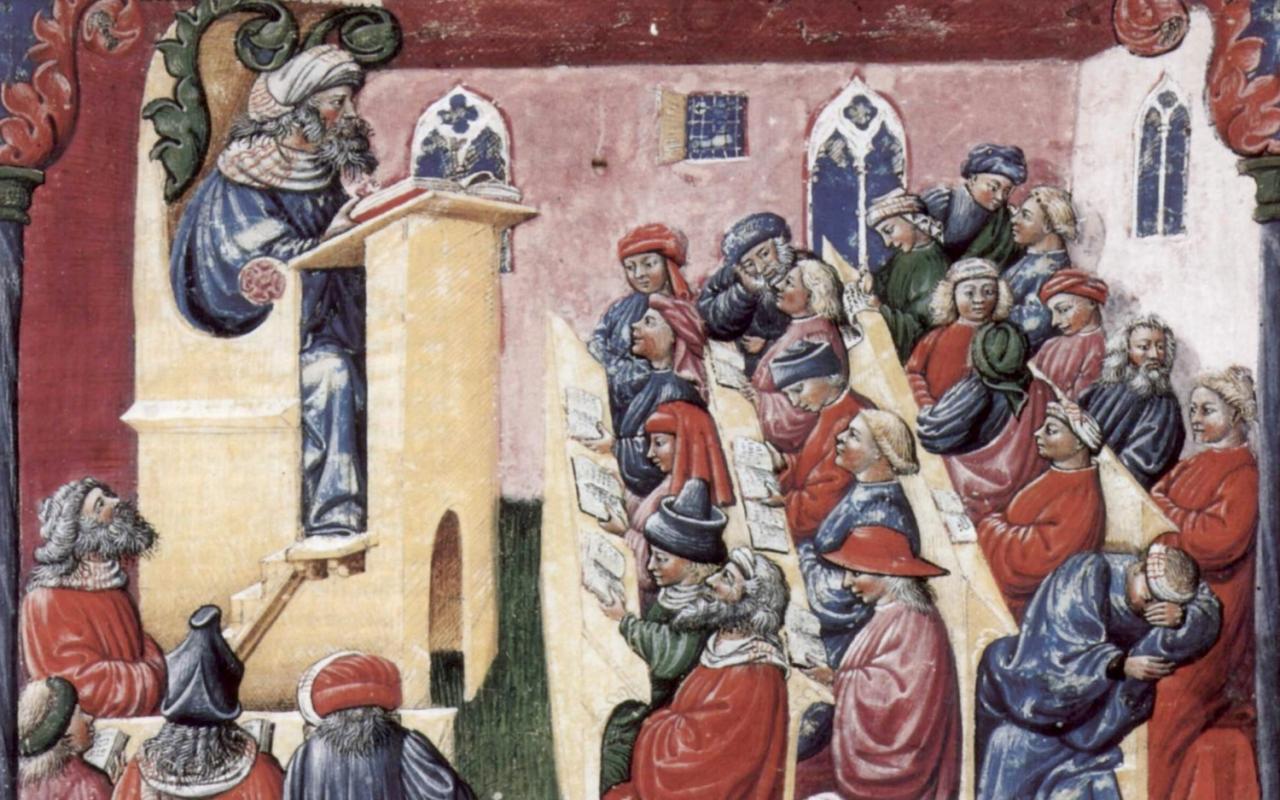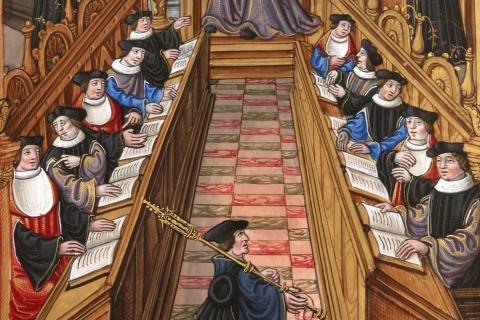
Born of the anthropological dilemma, a clear-minded approach to the search for truth is of vital importance for all people - and especially for those who would serve as Christ's ministers.
Every human being faces an anthropological dilemma: Who am I? What am I? Where am I? I’m seeking my own fulfillment, but how do I go about it? Where can I find answers? Although we have some sense for it, we don’t know quite who we are or why we exist, and we are driven to find out. Thus St. Thomas Aquinas referred to the human person as homo viator – man on the way.
This dilemma arises from our very nature. God created each human person but has not yet brought us to our final form: full humanity is something that needs to be achieved. God is like a sculptor who has awakened his work of art just before its completion, saying to it, “I will not complete you without you.” This accounts for a momentous and unique aspect of what it means to be human: our own subsidiary involvement in what we become. And whether we are aware of this aspect of our existence clearly or obliquely, we are aware that the answers to our greatest questions are not simply inside of us, but instead transcend us and are somewhere out there.
Despite the fact that we are all presented with the great anthropological dilemma, many of us have found it possible to drown it out, drug it down, or grind it under the heel of habits and distractions. Perhaps more indirectly, many of us have lost sight of the anthropological dilemma amidst the pleasure, suffering, and numbing boredom of daily life. Yet remaining blind to our greatest questions doesn’t bring us peace; instead, it merely leaves us adrift. Thus, in many of us, the great philosophic spark that belongs to us by our very nature needs to be reawakened and the quest for answers taken up anew.
But our avoidance of or mere apathy to these fundamental questions are not the only ways in which we can go wrong. Whether we are aware of it or not, the modern Western mind is heavily influenced by the writings of philosophers. For instance, our favoring of the sort of “clear and distinct” knowledge that comes from mathematics and the empirical sciences over and above the sort of knowledge that comes from philosophy and theology arises largely from the thought of Rene Descartes. Similarly, the notion that what we are does not have an immediate bearing on how we should behave comes not from some perennial intuition but instead results from the influence of David Hume. These are just two examples: a list of the ways the writings of philosophers have influenced the modern Western mind would fill volumes. Whether we are aware of it or not, the history of philosophy has shaped us all.
And thus the answer to the question of why seminarians should study philosophy begins to come into view. All people – whether Christian or otherwise – have the spark within them to search after the great questions of human existence that have been taken up by philosophers throughout human history. The fact that many have lost sight of this philosophic impulse is itself a wound in need of healing, and even where that impulse is alive and well, the human mind – flawed and tainted by sin – has right ways and wrong ways of operating and thus requires guidance and assistance. The positive aspect of good philosophic training is that it helps us to think well and strengthen our minds, enabling us to come across truth as much as possible. The negative – or defensive – aspect of good philosophic training is that it acquaints us with the ways in which the human mind tends to go wrong in its quest for knowledge, including perhaps most importantly the ways in which it tends to go plausibly wrong. Thus seminarians – as human beings – will benefit from the intellectual healing and guidance of philosophy.
It may not be feasible to expect that all people have the opportunity to enter into the dedicated study of philosophy, even if all people could find benefit from it. But it is feasible that some select persons have the basic philosophic training necessary to assist others in navigating their greatest human questions. It is feasible that some select persons become acquainted with the ways in which the human mind tends to go wrong and the ways in which the modern Western mind has been formed philosophically in ways that run contrary to the Gospel. In short, while it may not be feasible that all Christian disciples receive direct philosophic training in a classroom setting, it is both feasible and favorable that their shepherds do. Not every seminarian will come to mastery of philosophy, but surely the ministry of human souls will be aided by such training.
There’s a further way in which good philosophic training is important for seminarians. Consider Aquinas’s famous axiom, “Grace does not destroy nature, but perfects it.” The grace of God builds upon and enhances what is naturally true, and in this way depends upon it. So the discipline of theology, which is the application of human reason to the data of revelation, requires right reasoning as it plumbs the depths of God’s revelation. A well-formed mind is essential for understanding God’s revelation and staying true to the Faith.
The goal of philosophic study is often described as acquiring the habit of wisdom, which is at its heart something integrative: it involves seeing all things in relation to the highest cause, God. This habit has sometimes been referred to as a philosophic habit of mind. Whichever name is used, Christian education has long recognized that numerous fields of study are quired for the full formation of such a habit of mind, as a broad range of study helps to form the mind in seeing how a broad range of insights and questions fit together cohesively. So while the acquisition of philosophic first principles and perennial truths is a necessary aspect of this habit of mind, the ultimate attainment of this habit of mind also requires experience and a broad vision of human life formed through the humanities.
Understanding that such a habit of mind is the goal of philosophy can help seminarians to understand not only why they must study philosophy, but why their particular program of philosophic study is structured as it is. For if it is important to capture the correct first principles and analyze common errors in addition to gaining a view of how all things fit together and inform human life, we can expect the program of philosophic formation to offer pathways to both. Thus, the sort of philosophic formation called for by the Church consists of a curriculum split between topical courses (such as metaphysics, ethics, and logic) and historical courses tracing the contours of the four ages of Western philosophy. This two-pronged approach to a philosophy curriculum mirrors the goal of philosophic study and the complexity of the history of philosophic thought.
Consider that a central aspect of the philosophic quest has consisted of humanity attempting to transcend the changeable, imperfect world around us to find that which is true in all places and ages. To put it differently, much of the philosophic quest has consisted of humanity attempting to discover and understand the perennial truths that underlie reality, desiring to understand those principles and ideals that don’t change with time, place, or culture. This was a central concern of the philosophers of the Greek Golden Age, so it comes as no surprise that they viewed the field of geometry as both a symbol and an example of this sort of intellectual activity, for in geometry we attempt to understand the principles and formulae we encounter in the changeable world around us even while those principles and formulae themselves do not change. So while it is possible to describe a perfect circle, for instance, no such ideal exists in the material world. The same can be said of the concepts that have long been sought by philosophers: although goodness, justice, and truth are in their essence beyond time, space, and change, we encounter many things in the world around us that participate in them to various degrees even if these participants are not the changeless essences themselves.
In such an approach to philosophy, studying the history of philosophy would seem to offer little fruit. If the entire purpose of philosophic thought is to arrive at truths that transcend time, space, and culture, such a historical study could offer little more than interesting facts about how perennial truths have been discovered and debated amidst the course of human affairs. But in the Romantic view of the world, for instance, which arose in response to a perceived over-emphasis on the mathematical element of philosophy, a very different vision of the history of philosophy arose. The Romantics, who believed that plants serve as a fitting metaphor for human existence, recognized that one must understand the growth of something to understand what it is. Thus, these thinkers view the human person and human societies as engaged on a long journey, recognizing that philosophic questions (and answers) arise within particular contexts, respond to insights and arguments from previous philosophers, and often serve as the foundation from which future philosophers will build or diverge. In this vision of the world, the study of the history of philosophy is essential to the philosophic question.
The Christian view of the world invites us to appreciate the truths contained in both visions. Christ is Logos – word, reason, and perennial reality – made flesh. He is the Changeless entered into the Changeable. This recognition has driven Christians to be great champions of both the classical and Romantic impulses, as Christ himself holds together these two halves of reality in the West. With the removal of Christ from the center of the West’s vision, however, these two aspects of reality have begun to fall apart in the Western mind without disappearing, leading to a sort of intellectual schizophrenia. But for the Christian student of philosophy, both of these aspects must be held together. The Christian philosopher recognizes that the search for perennial truths that transcend the changing world around us and a proper understanding of how these truths have been sought and impacted humanity on our journey through time and space must be held side-by-side.
And perhaps it is by viewing Western philosophy in terms of holding these two aspects of reality together that we arrive at a deeper understanding of wisdom. Wisdom consists in the right apprehensions and application of perennial truths to the massively changeful times, places, and activities of human life. Wisdom integrates the perennial, absolute principles of reality and tries to get ahold of all the changeable things around us. Thus wisdom arises at the meeting point of the two aspects of philosophy described above.
So why should seminarians study philosophy? The study of philosophy – especially when carried out in the manner prescribed by the Church – engages seminarians in the deeply human endeavor of searching after answers to the questions that present themselves to us all. In entering into the philosophic quest in a direct way, seminarians are brought into contact not only with the principles that have influenced humans through history, but with the principles that influence the people to whom they will minister – not only with the ways in which philosophic thought has arisen throughout history, but with the ways in which philosophic thought arises in our midst. In short, the seminarian studies philosophy not because he will save the world as a philosopher; instead, the seminarian studies philosophy because wisdom will be necessary for ministering to the souls that will be entrusted to his care upon his ordination and will be necessary for plumbing the depths of the truths God has imparted for our salvation.

